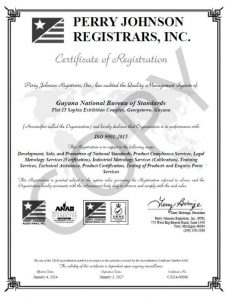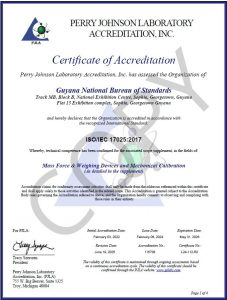Have you ever wondered how the Guyana National Bureau of Standards (GNBS) knows that its scales, masses and other measuring instruments used in verification and calibration are accurate? Well, in this week’s article you will find out.
The GNBS as the National Measurement Institute (NMI) employs the principle of ‘Traceability’ to ensure that all measurements used in Guyana are internationally accepted.
Traceability is defined by the American National Standards Institute (ANSI) as “the result of a measurement whereby it can be related to appropriate standards, generally national or international standards, through an unbroken chain of comparisons.” Traceability allows us to recognise and appreciate that a kilogram of potatoes or a litre of gasoline is the same in Guyana, India, and South Africa.
The unbroken link of traceable measurements exists from retail in Guyana to the highest level internationally. Put simply, the measurements from the weighing instruments used at markets and shops are traceable to the Working or Field Standards used by GNBS Inspectors to verify them. These Working Standards are traceable to the National Reference Standards held in the GNBS Laboratory, and these Reference Standards are traceable to others kept at more advanced NMI’s in other countries. Finally, the Standards kept by advanced NMIs are traceable to the International System of Units, with the highest measurement accuracy.
Three major facts are mutually agreed to in order to maintain traceability. The worldwide adoption of the International System of Units (SI) of measurements, the establishment of national laboratories which are responsible for the maintenance of the use of the SI units, and the implementation of methods and procedures that allow individual calibration laboratories to compare their local standards with those of the national laboratories.
Measurement traceability is important to provide assurance of accuracy to both customers and manufacturers for a given process or transaction, whether in Guyana or elsewhere. It is relevant to many other measurement applications including those environmental testing, medical testing, and scientific research. Meanwhile, measurement traceability and accuracy continue to be critical as Guyana seeks to increase exports to other countries; and as more foreign companies enter the local economy to serve the Oil and Gas and other key sectors.
The GNBS Industrial Metrology and Testing (IMT) Department provides calibration to stakeholders in the areas of Mass, Dimension, Volume, Pressure, Temperature and Torque. To increase stakeholder confidence in measurement results provided, the Department was accredited to the International Standard ISO/IEC 17025:2017 – General requirements for the competence of testing and calibration laboratories. The Standard specifies the general requirements for the competence, impartiality, and consistent operation of laboratories. Compliance with the requirements of the standard guarantees international acceptance of measurement results.
Finally, to ensure measurement traceability, local companies and laboratories can submit their measuring instruments for calibration by the GNBS. Instruments calibrated by the GNBS include weight sets, digital multimeters, provers, pressure gauges, calipers, torque, wrenches, gauge blocks, balances, measuring cylinders, thermometers, micrometers and micropipettes.
For further information, please contact the GNBS on Tel: 219- 0066 or visit our website: www.gnbsgy.org or like us on Facebook: gnbsgy






